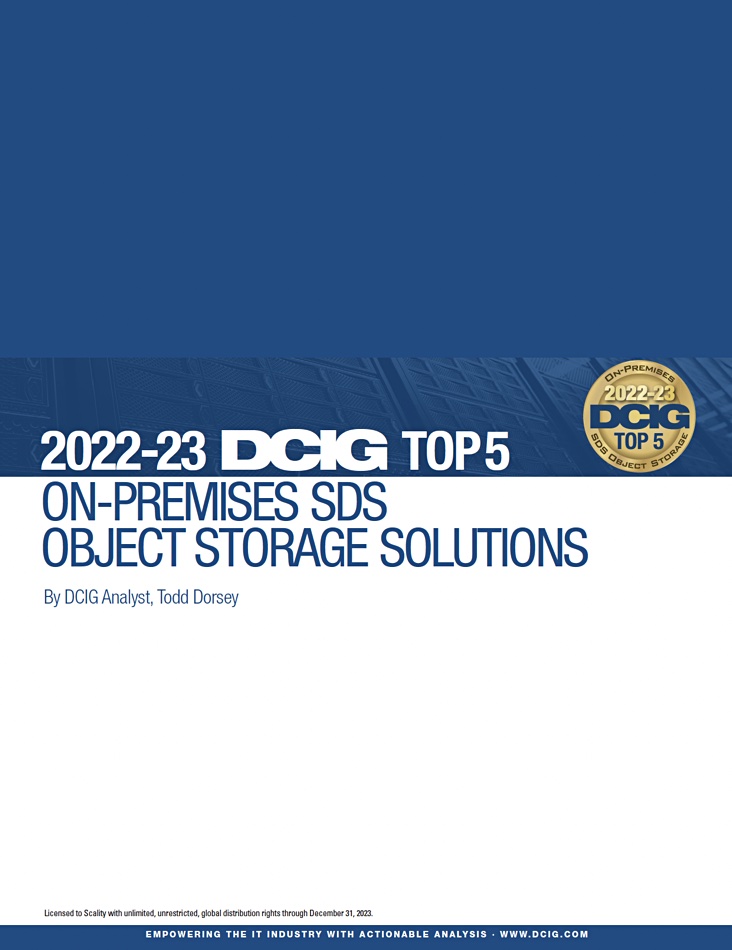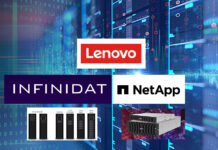A DCIG report examined software-defined object storage and named its top five picks but failed to evaluate Dell EMC’s ECS or NetApp’s StorageGRID.
Update. DCIG reasons for not including Dell ECS and NetApp StorageGRID added. 1 March 2022.
Eighteen suppliers’ products were evaluated and the top five were Scality RING, Cloudian HyperStore, Hitachi Vantara HCP, MinIO, and Nutanix Objects. These five products featured robust technical support facilities, public cloud support, wide deployment options (bare-metal, Linux, virtual machines, etc.), directory services integration, role-based access controls, data protection (erasure coding, replication), immutable storage (object lock), robust analytics, and value-added services. The report does not state if they are ranked in any particular way.

A November 2021 Gartner Critical Capabilities report evaluating 17 products from 15 vendors in the distributed file systems and object storage area put Scality at the top. It also included Dell EMC’s ECS and NetApp’s StorageGRID in its set of evaluated suppliers and products.
The report author writes: “To arrive at the DCIG TOP 5 solutions included in this report, DCIG went through a seven-step process to come to the most objective conclusions possible. The process is as follows:
- DCIG established which features would be evaluated.
- The features were grouped into five general categories.
- A survey was created and completed for each solution. Vendors were given the opportunity to review and complete the survey.
- DCIG identified solutions that met DCIG’s definition for an On-Premises SDS Object Storage Solution.
- DCIG weighted each feature to establish a scoring rubric.
- DCIG evaluated each solution based on information gathered in its survey.
- Solutions were ranked using standard scoring techniques.
However, the actual supplier scores have not been revealed by DCIG.
The 13 lesser suppliers and products were:
- Cohesity Helios
- DataCore Software Swarm
- Hammerspace
- IBM Cloud Object Storage
- iXsystems TrueNAS
- Nexustorage Limited Nexfs
- OpenIO
- Red Hat Ceph Storage
- StoneFly StoneFusion
- StorONE S1 Enterprise Storage Platform
- Swiftstack Storage
- WekaIO WekaFS
- Zadara VPSA
DCIG’s report inclusion criteria included:
- Commercially available as of 1 January 2022.
- Sufficient, publicly available information available for DCIG to make an informed decision.
- The solution must support the S3 API.
- The product may be available as a pre-integrated software and hardware appliance from a solution provider.
- If available as a pre-integrated appliance, the product must also be available on servers from multiple OEMs, as software that can be installed on hardware from other providers or run in the cloud.
We can’t see how these criteria could exclude Dell EMC and NetApp, unless there wasn’t ”sufficient, publicly available information available for DCIG to make an informed decision.”
Ken Clipperton, the Lead Analyst for Storage at DCIG told us: “We decided not to cover Dell ECS and NetApp StorageGRID as a review of the material on their websites showed a focus on their own branded appliances.”
Dell describes the ECS product as: “Exabyte-scale. Extreme performance. Enterprise-grade. ECS, the leading object storage platform from Dell EMC, boasts unmatched scalability, performance, resilience, and economics. Deployable as a turnkey appliance or in a software-defined model, ECS delivers rich S3-compatibility on a globally distributed architecture, empowering organisations to support enterprise workloads such as cloud-native, archive, IoT, AI, and big data analytics applications at scale.“
A Dell spokesperson confirmed: “We weren’t asked to participate.”
NetApp says: “StorageGRID software-defined object storage suite supports a wide range of use cases across public, private, and in hybrid multi-cloud environments seamlessly. With industry leading innovations, NetApp StorageGRID stores, secures, protects, and preserves unstructured data for multi-purpose use including automated lifecycle management for long periods of time.”
As well as ignoring Dell and NetApp, the DCIG report did not look at Huawei’s Fusion Storage, Intel’s open-source DAOS (Distributed Application Object Storage) product, nor Quantum’s ActiveScale, but that may be because it was not classed as software-defined.
Clipperton said: ” Regarding Intel DAOS, we decided not to include it as it focuses on Intel Optane technology and HPC use cases rather than general-purpose on-premises object storage.”
Blocks and Files has asked Dell EMC and NetApp to comment.








